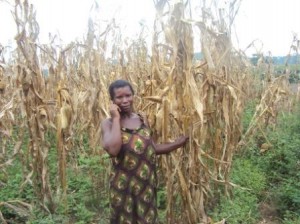By Solomon Akugizibwe
On Thursday 4th August, 2011 Toro Development Network (ToroDev) Staff had a tiresome but rather fruitful journey to the pre-dominantly maize growing areas of Kamwenge District in Western Uganda.

The reason was to asses’ progress of ToroDev’s in Partnership with Stem van Afrika interventions in Rural FM radio broadcasting for Entrepreneurship Development in the Rwenzori Region.
The stop over was Mrs. Muhereza Phoebic maize farm, on the outskirts of Kamwenge town. In November 2010 ToroDev in Partnership with Stem van Afrika organized knowledge sharing and training workshops for small scale rural women and youth grassroot entrepreneurs on how they can use Rural FM radio stations to market their produce, services and information access for small scale rural entrepreneurship development.
The workshop was attended by over 47 women and youth rural small scale entrepreneurs from Kamwenge District. Mrs. Muhereza was one of the participants for the training. Since Rwenzori region in pre-dominantly an agricultural area, most of the participants were farmers.
After the workshop, a radio listenership club was formed for Kamwenge district which among other things was to lobby for better FM radio broadcasting and programming for rural entrepreneurship development.
According to Muhereza, local farmers especially members of the listenership club can now participate on Voice of Kamwenge agricultural radio programmes every Saturdays to share information and market their products because they are more organized and more networked with the radio staff. In addition, they are now more aware of the appropriate times and appropriate radio programs to access information related to markets especially for agricultural products.
The problem she finds in using FM radio stations is the high costs they still charge on advertisements for agricultural produce.
“Apart from FM radio stations, we also use mobile phones for information access and market for our maize. Mobile phones have greatly helped to link us with the middlemen who buy the maize” Says Mrs Muhereza.
Although Muhereza is a successful maize farmer, to guard against the natural calamities and price fluctuations, she has diversified to poultry and cattle farming.
She attributes her successes to her husband who she describes as “very supportive” and together they have been able to pay school fees to their four children (one at the university) and construct two permanent houses (one commercial in the town council).
Despite all the success, she says the challenges are still quite enormous, “We have had challenges of increasing capital for agribusiness development because of high interest rates for loans from microfinance institutions and other banks and high loan security demands.”
After witnessing the fruits of unity through utilizing the listenership clubs to participate in agbusiness promotion radio programs, Muhereza is now focusing on mobilsing other maize farmers to jointly market and sell their maize produce to avoid exploitation by middlemen.
She adds that joint ventures with other maize farmers will also help reduce on the costs of radio advertisements and ensure better lobbying for better government services like better roads and reduced interest rates on loans among other benefits.
The writer works with Toro Development Network (ToroDev)

















